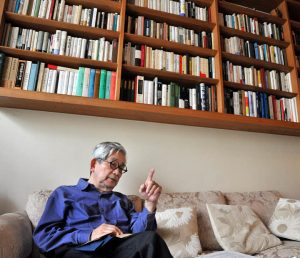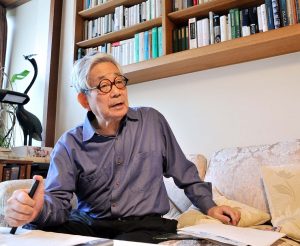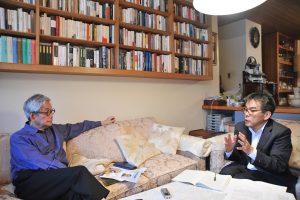In Memoriam: Kenzaburo Oe — Following the lead of people of the A-bombed cities
Mar. 14, 2023
by Masami Nishimoto, former Senior Staff Writer
Kenzaburo Oe, a writer inspired by Hiroshima, expressed his ideas from the side of those who experienced the atomic bombings. In Hiroshima Notes, a book that was published in 1965 when Mr. Oe was still young and is still read today, he described the people he met in Hiroshima as “those who never give in under any circumstances.” That idea was reflected in his own life. He posed the question about how to come to terms with a world threatened by the ultimate violence of nuclear weapons. As a globally renowned author, Mr. Oe wrote with rich expressiveness about the rebirth of humanity.
In the fall of 2010, when working as a reporter for the Chugoku Shimbun, I received a fax from Mr. Oe in response to my request for an interview. “I will tell you what is on my mind at my home,” the missive indicated. With that, I had the opportunity to interview Mr. Oe personally, at his home in Setagaya Ward, Tokyo.
That year, the family of the late Toshihiro Kanai, who served as chief editorial writer at the Chugoku Shimbun, had donated Mr. Kanai’s personal letters and materials to Hiroshima University. I learned that included within was a letter from Mr. Oe. It read, “I will get an advance on royalties from Hiroshima Notes and send 300,000 yen to Mr. [Fumio] Shigeto and 200,000 yen to you [Mr. Kanai] as part of the funds to start the campaign calling for creation of a white paper on devastation caused by the atomic bombings.” The letter was postmarked April 16, 1965.
In the letter, Mr. Oe described how he had met Mr. Shigeto, then director of the Hiroshima Atomic-bomb Survivors Hospital, Mr. Kanai, and others. “Despite suffering from the atomic bombing, they have recovered themselves and accomplished their tasks without giving in. I met a number of people I should call ‘unknown soldiers,’ including Mr. Shigeto. I seized an opportunity to get back on my feet as a young father. I saw how I should live with my son, Hikari, in their way of living. Reflecting on Hiroshima became the basis of my life and my literature. This means that I think and write by returning to models of human beings, and reflect these models in my writing.”
He expressed the essence of his literature without pretense. In one of his most well-known works, A Personal Matter, Mr. Oe depicted another scene of Hikari, who had grown into adulthood and begun composing music, as he relaxed at a dining table in a room filled with luminescence.
Mr. Oe dubbed August 6, 1945, “Year Zero of the Nuclear Age” and objected to the current situation in which the “nuclear authority” described by Mr. Kanai oppressed the world. He would strongly criticize the double standard employed by Japan in terms of its own dealings with nuclear weapons.
“Stability cannot be secured in Asia if Japan tolerates U.S. nuclear weapons while regarding the nuclear arms of other nations as a threat. A new national campaign from Hiroshima is needed,” wrote Oe. “We should not betray those who died in the bombings. We must consider this as a universal human issue and live toward nuclear abolition.”
On the other hand, he said, “As a writer, I’m spending my later years with a heavy heart. I’m afraid that I will die as someone whose writing and statements did not really play a role for the elimination of nuclear weapons.”
At the same time, he quoted Blaise Pascal’s words about the instincts of human beings to elevate themselves and referred to the stand taken by Edward Said, a critic of the Palestinian issue who was also a personal friend of Mr. Oe. “I have hope for nuclear abolition because it is what human beings do. I can say that I believe that abolition will be realized,” Mr. Oe wrote, as if peering into the future.
He continued to respond to me by fax. “I do not recall anything about the letters I previously received from you,” he wrote back in 2016, referring to his anxiety at growing older. In 2018, the year the publication of the complete collection of his writings began, I decided to refrain from sending letters after learning of his health issues from a former NHK director in whom Mr. Oe’s family placed their trust.
The writer has passed away, but his works remain. I end this piece with a quote from the conclusion of his Hiroshima Notes, a publication that has sold more than one million copies.
“I want to stand in solidarity with those who never despair, and never hope for too much, those who go on doing their day’s work, those whom I regard as the most orthodox post-atomic-bomb Japanese.” It is the citizens of the A-bombed cities who will carry on his legacy.
Kenzaburo Oe died on March 3 at the age of 88.
(Originally published on March 14, 2023)
Kenzaburo Oe, a writer inspired by Hiroshima, expressed his ideas from the side of those who experienced the atomic bombings. In Hiroshima Notes, a book that was published in 1965 when Mr. Oe was still young and is still read today, he described the people he met in Hiroshima as “those who never give in under any circumstances.” That idea was reflected in his own life. He posed the question about how to come to terms with a world threatened by the ultimate violence of nuclear weapons. As a globally renowned author, Mr. Oe wrote with rich expressiveness about the rebirth of humanity.
In the fall of 2010, when working as a reporter for the Chugoku Shimbun, I received a fax from Mr. Oe in response to my request for an interview. “I will tell you what is on my mind at my home,” the missive indicated. With that, I had the opportunity to interview Mr. Oe personally, at his home in Setagaya Ward, Tokyo.
That year, the family of the late Toshihiro Kanai, who served as chief editorial writer at the Chugoku Shimbun, had donated Mr. Kanai’s personal letters and materials to Hiroshima University. I learned that included within was a letter from Mr. Oe. It read, “I will get an advance on royalties from Hiroshima Notes and send 300,000 yen to Mr. [Fumio] Shigeto and 200,000 yen to you [Mr. Kanai] as part of the funds to start the campaign calling for creation of a white paper on devastation caused by the atomic bombings.” The letter was postmarked April 16, 1965.
In the letter, Mr. Oe described how he had met Mr. Shigeto, then director of the Hiroshima Atomic-bomb Survivors Hospital, Mr. Kanai, and others. “Despite suffering from the atomic bombing, they have recovered themselves and accomplished their tasks without giving in. I met a number of people I should call ‘unknown soldiers,’ including Mr. Shigeto. I seized an opportunity to get back on my feet as a young father. I saw how I should live with my son, Hikari, in their way of living. Reflecting on Hiroshima became the basis of my life and my literature. This means that I think and write by returning to models of human beings, and reflect these models in my writing.”
He expressed the essence of his literature without pretense. In one of his most well-known works, A Personal Matter, Mr. Oe depicted another scene of Hikari, who had grown into adulthood and begun composing music, as he relaxed at a dining table in a room filled with luminescence.
Mr. Oe dubbed August 6, 1945, “Year Zero of the Nuclear Age” and objected to the current situation in which the “nuclear authority” described by Mr. Kanai oppressed the world. He would strongly criticize the double standard employed by Japan in terms of its own dealings with nuclear weapons.
“Stability cannot be secured in Asia if Japan tolerates U.S. nuclear weapons while regarding the nuclear arms of other nations as a threat. A new national campaign from Hiroshima is needed,” wrote Oe. “We should not betray those who died in the bombings. We must consider this as a universal human issue and live toward nuclear abolition.”
On the other hand, he said, “As a writer, I’m spending my later years with a heavy heart. I’m afraid that I will die as someone whose writing and statements did not really play a role for the elimination of nuclear weapons.”
At the same time, he quoted Blaise Pascal’s words about the instincts of human beings to elevate themselves and referred to the stand taken by Edward Said, a critic of the Palestinian issue who was also a personal friend of Mr. Oe. “I have hope for nuclear abolition because it is what human beings do. I can say that I believe that abolition will be realized,” Mr. Oe wrote, as if peering into the future.
He continued to respond to me by fax. “I do not recall anything about the letters I previously received from you,” he wrote back in 2016, referring to his anxiety at growing older. In 2018, the year the publication of the complete collection of his writings began, I decided to refrain from sending letters after learning of his health issues from a former NHK director in whom Mr. Oe’s family placed their trust.
The writer has passed away, but his works remain. I end this piece with a quote from the conclusion of his Hiroshima Notes, a publication that has sold more than one million copies.
“I want to stand in solidarity with those who never despair, and never hope for too much, those who go on doing their day’s work, those whom I regard as the most orthodox post-atomic-bomb Japanese.” It is the citizens of the A-bombed cities who will carry on his legacy.
Kenzaburo Oe died on March 3 at the age of 88.
(Originally published on March 14, 2023)










